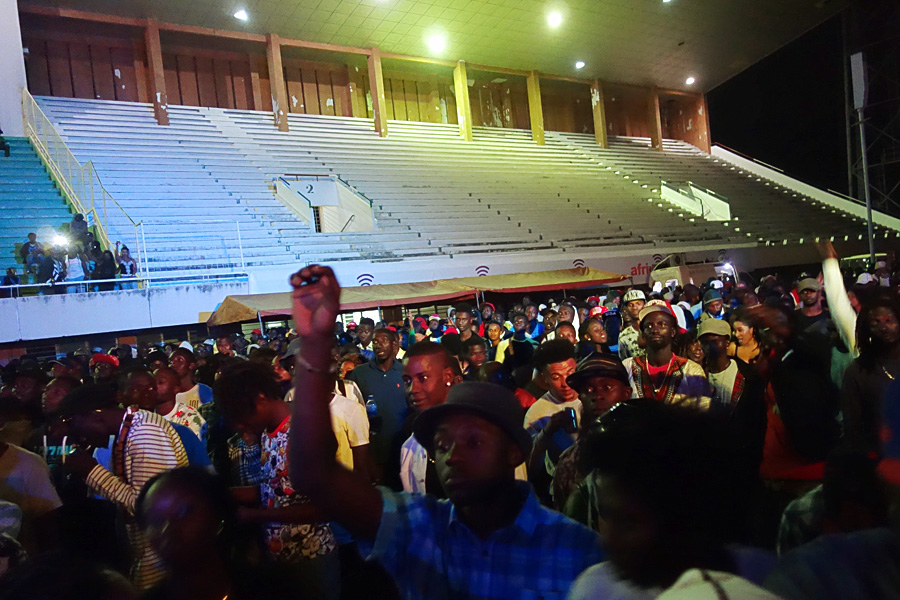
| archive > diary > january 17 | ||
 | ||
|
Tuesday, 31 i finished my translation of African Gigolo and printed it before i migrated to The Gambia. finally i managed to document it. see here pls Thursday, 19 sometimes the secret is better than the story. let's say an experience you've made carries a bunch of nexuses and supersensible meanings, ambiguities and fortunetelling indications. you feel spurred to the extent of bursting. but in the moment you start talking about it you realise that it is losing its magic. nobody understands what it is about, because the thread appears only to you. in order to save its energy i recommend: don't tell the story, but keep it as an assistance on your way back to the beginning of motivation within the labyrinth of synapses. Sunday, 8 I am here in my room lying on my bed like often on Sundays or in the evening after work. Surrounded by boys - that is how they call themselves, but them, they are all men... 20+ - i don't feel like going out. Once in a while I join their round to smoke a cigarette as a reason to be among them. In those cases they are busy discussing a topic, for example Jammeh and his resignation, I just can watch them trying to catch some words, but a real understanding impossible, participating out of question. In case of silence I just sit down adding another silence or throw in an English sentence that then falls down like a strange apparition as a challenge to start a conversation. Sometimes they come and something starts to grow, sometimes nobody likes to answer and everybody continues staring into his smart phone like that is the world he actually lives in. Thursday, 5 2nd Session of RAW Académie: "Angazi, but I'm sure" "Angazi, but I'm sure" is a common South African phrase. In English it means: "I don't know, but I am sure". It is a deliberately self-contradictory phrase that is usually spoken in prelude to a reply – often, when one is asked for directions or facts. "Angazi, but I'm sure if you turn left you will get there"; "Angazi, but I'm sure they will start at 9pm". The respondent is uncertain – of what they "know". Or, perhaps, they are certain, but they do not know how to speak it. Or, they know, but do not know what they know. Sharing knowledge in this way requires mutual trust – it is speculation, in every sense of the word. "Angazi, but I'm sure" is a break between our linguistic selves and a world, between knowledge and our ability to speak or map it – the knowledge that is elevated as finished product. The phrase suggests that arriving is as much about displacement as about place. More urgently, it affirms lived experience, improvisation and imagination as themselves forms of knowledge. It calls for a knowing through seeking and a constant transforming and renewing of our image of the world. Finally, it is an expression of community: "I know you will find the way". How do we learn to know what we know? How can we draw from disparate and often intersecting practices through which we stylise our conduct and daily life on the continent? How do we harness the inventiveness, the generative resilience and the agility with which we live? This requires not only a new set of questions, but its own set of tools; new practices and methodologies that allow us to engage the lines of flight, of fragility, the precariousness, as well as joy and creativity and beauty that define the contemporary African moment. Chimurenga has long considered the shebeen (illegal drinking tavern) as a college of music. Can we draw on the improvisational, pedagogical method of black musics, where learning is collapsed into performing, and teachers and learners share the stage? How do we embrace knowledge not as information but as a methodology – a way of learning that expresses the conditions of our lives, our very existence. Can we take seriously food as knowledge, music as research and pan-Africanism as a practice? What if maps were made by Africans for their own use, to understand and make visible their own realities and imaginaries? What could the curriculum be – if it was designed by the people who dropped out of school so that they could breathe? RAW Academy Application 2017 Wednesday, 4 Exchanging our dreams and hope Tuesday, 3 Mandinka - The drumming of the heart and the head dances to it. - If you jump and step on fire, jumping is not finished. - Some words are closer to the mouth but are not meant to be said. - Equality is there but not at the same level. Pulaar - A person should not be busy collecting cow dung whilst their colleagues are busy collecting cows. - If ten are digging and ten are refilling, no hole will be available. - I am like this, i am like that. Let your actions speak. - It is the sick who seeks a doctor. Wollof - No one learns to swim in the middle of the sea. - Slowly, slowly, one catches the monkey in the forest. - A promise is a debt. - Tomorrow has not yet come, but it needs to be given its share. Mandinka, Pulaar and Wollof Proverbs. Writers' Association of The Gambia. 2012 |